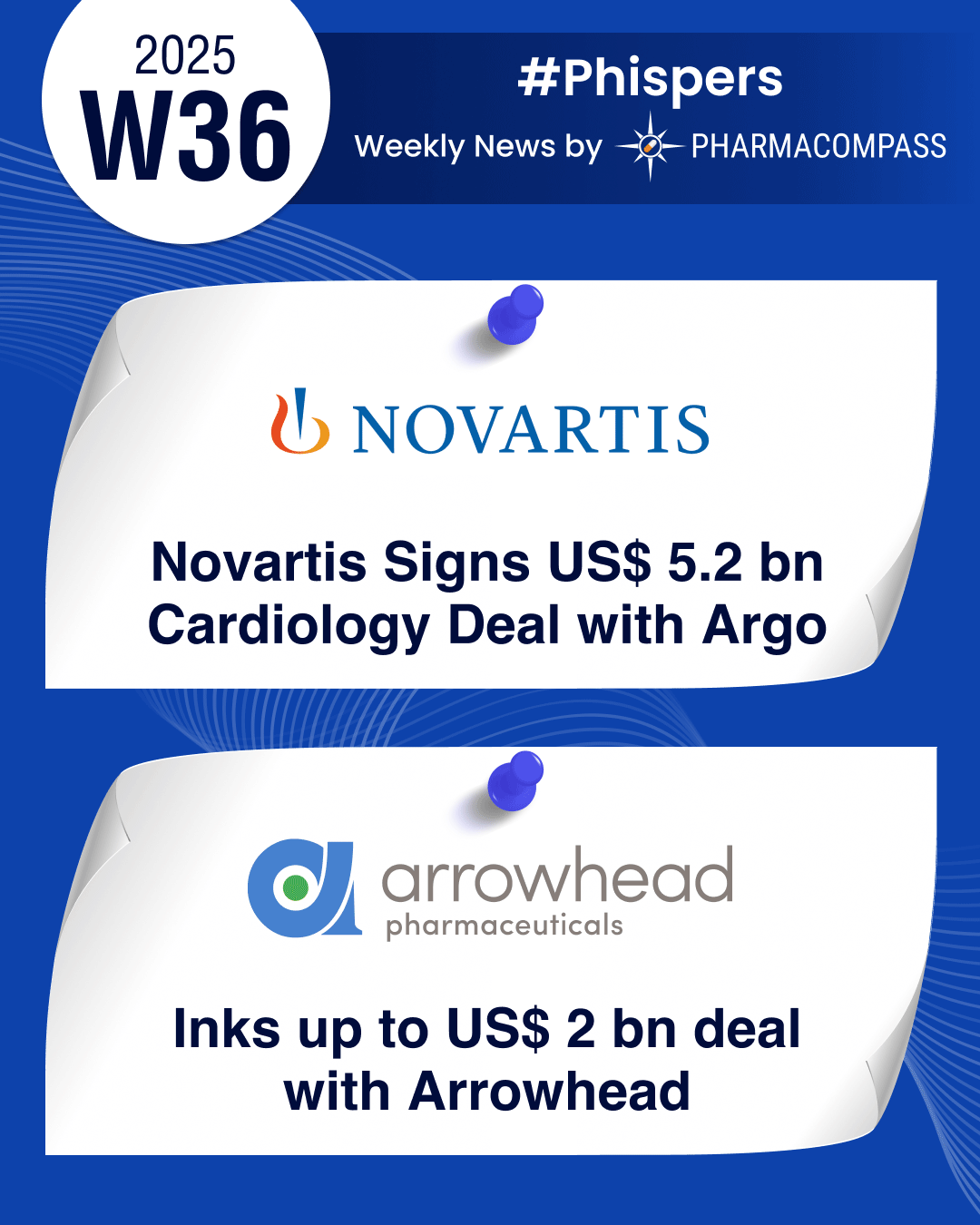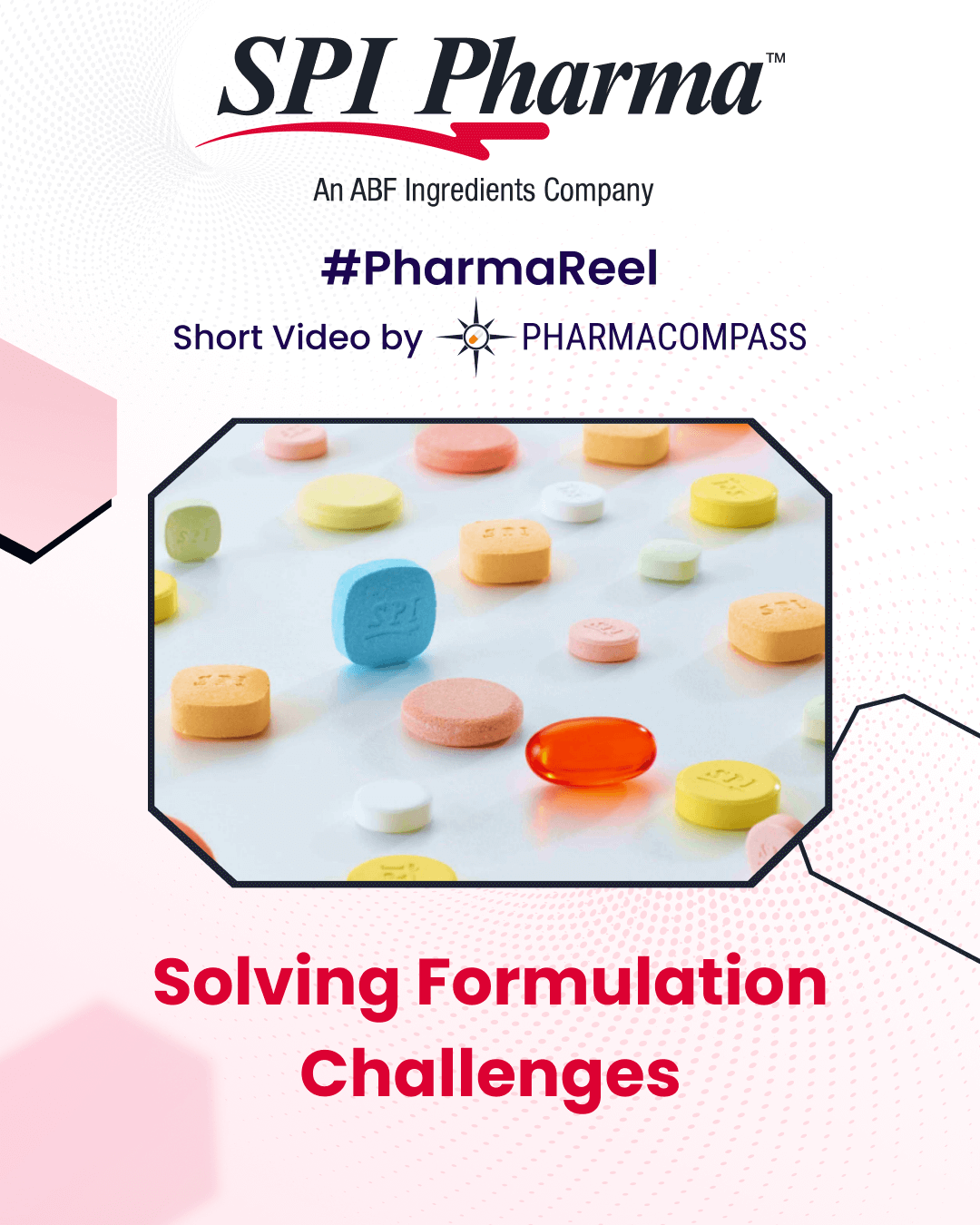
By PharmaCompass
2025-09-04
Impressions: 883 Article || 73 Video
Novartis signed two deals this week — a US$ 5.2 billion cardiology deal with China’s Argo Biopharmaceuticals, and a US$ 2 billion deal with Arrowhead Pharmaceuticals for its preclinical therapy aimed at treating neurodegenerative diseases such as Parkinson’s.
In other deals, Vertex Pharmaceuticals partnered with California-based Enlaza Therapeutics in a deal valued at up to US$ 2 billion to discover new medicines for autoimmune diseases.
The chaos over vaccines in the US deepened this week with President Donald Trump calling on drugmakers to prove the effectiveness of their Covid vaccines, and to justify their successes, in a social media post. Pfizer’s CEO Albert Bourla responded to Trump’s post through a statement. Meanwhile, several health groups have sought the resignation of Health Secretary Robert F Kennedy Jr (RFK Jr) for disregarding decades of lifesaving science.
In approvals, the US Food and Drug Administration (FDA) cleared Sanofi’s Wayrilz, an oral drug for adults with immune thrombocytopenia (a deficiency of platelets in the blood), and Teva’s generic version of Novo Nordisk’s Saxenda. Teva’s copycat Saxenda is the first GLP-1 generic approved for weight loss.
AstraZeneca is preparing to file for an FDA approval of its investigational blood pressure pill baxdrostat by 2025-end, with launches targeted for 2026. Merck reported phase 3 success for its oral cholesterol drug. And United Therapeutics said its inhaled drug Tyvaso (treprostinil) improved lung function in a late-stage trial on patients with idiopathic pulmonary fibrosis (IPF), a serious lung disease.
Novartis signs US$ 5.2 bn cardiology deal with China’s Argo, US$ 2 bn deal with Arrowhead for its Parkinson’s med
Novartis has been on a deal-making spree. Last month, there were reports that Novartis is looking to buy US biotech Avidity Biosciences to grow its pipeline. While there are no updates on the Avidity buyout, the Swiss drugmaker did announce two deals this week. First, it signed a licensing and options deal with China-based Argo Biopharmaceuticals worth up to US$ 5.2 billion for Argo’s experimental candidates that target cardiovascular diseases.
Second, it inked a US$ 2 billion exclusive worldwide licensing and collaboration deal with Arrowhead Pharmaceuticals for its preclinical stage candidate for the treatment of neurodegenerative diseases such as Parkinson’s, and for other targets utilizing its proprietary RNA interface (RNAi) platform. Novartis will pay Arrowhead US$ 200 million upfront, with additional payments tied to milestones, and royalties tied to future sales.
Even the Novartis-Argo deal is based on Argo’s RNAi technology for heart diseases that silences harmful genes that contribute to the disease. Argo will receive an upfront payment of US$ 160 million, along with milestone payments and royalties.
Vertex, Enlaza strike US$ 2 bn deal: Vertex Pharmaceuticals is teaming with California-based biotech Enlaza Therapeutics to discover new medicines for autoimmune diseases and to improve conditioning for Casgevy, its approved gene-editing therapy for sickle cell disease and beta thalassemia. Enlaza will receive US$ 45 million upfront and is eligible for up to US$ 2 billion in milestones payments and royalties.
Trump asks drugmakers to explain how Covid jabs work; health groups seek RFK Jr’s resignation
The chaos over vaccines just got deeper with US President Donald Trump asking drugmakers to explain how well their Covid medicines and vaccines work, and to justify their successes, through a social media post. His comments have come after FDA restricted the newest Covid vaccines to people at a higher risk of severe illness. Trump’s post also follows major leadership changes at the Centers for Disease Control and Prevention (CDC).
Pfizer’s CEO Albert Bourla responded to Trump’s post with a statement. “To date, data on Pfizer’s Covid-19 vaccine have appeared in over 60 peer-reviewed publications,” he said.
The statement also included a link to a cache of releases from Pfizer’s Covid-19 portfolio.
Meanwhile, several health groups and medical associations have asked US Health Secretary RFK Jr to step down. In a joint statement, they said RFK Jr was disregarding decades of lifesaving science.
Florida to end all vaccine mandates: Florida’s surgeon general, Joseph Ladapo, has said the state plans to end all its vaccine mandates, including those that are required by children in order to attend public schools. He likened the mandates to “slavery”.
FDA okays Teva’s generic to Novo’s Saxenda, first GLP-1 copycat for weight-loss
FDA has approved Teva’s generic version of Novo Nordisk’s Saxenda (liraglutide), making it the first generic GLP-1 drug for weight loss. The generic is cleared for adults and children aged 12 and older with obesity. Teva launched the drug soon after approval.
Clears Sanofi’s Wayrilz for rare autoimmune disorder: FDA has approved Sanofi’s oral drug, rilzabrutinib, for adults with persistent or chronic immune thrombocytopenia (ITP) who no longer respond to other treatments. ITP is an autoimmune disorder, where the immune system attacks platelets, or cell fragments that form clots (and stop or prevent bleeding). Sanofi plans to make Wayrilz available in the US in September, with a list price of US$ 17,500 per month.
Astra to seek approval for baxdrostat by year-end: AstraZeneca plans to seek regulatory approval from FDA and European regulators for its experimental blood pressure drug, baxdrostat, by the end of this year. The company hopes to launch the drug in 2026.
United Therapeutics’ Tyvaso shows strong results in lung disease trial
United Therapeutics said its inhaled drug Tyvaso, also known as treprostinil, improved lung function in a late-stage trial for idiopathic pulmonary fibrosis (IPF). IPF is a serious, progressive disease where scarred and stiff lung tissue makes breathing difficult. The drug also benefited patients taking standard antifibrotic therapies.
Merck’s oral cholesterol drug meets late-stage trial goal: Merck said its experimental oral drug, enlicitide decanoate, met the main goal of lowering “bad cholesterol” in a late-stage trial. The drug previously succeeded in two late-stage trials for hyperlipidemia, a condition marked by fat buildup in blood vessels that can cause heart attacks and strokes.
Ionis’ drug lowers fat levels in blood, cuts risk of pancreatitis: Ionis said its drug Tryngolza (olezarsen) lowered very high fat levels in the blood and reduced the risk of acute pancreatitis in people with severe hypertriglyceridemia (sHTG) in a pivotal phase 3 trial. This rare condition causes dangerously high triglyceride levels that can damage the pancreas and lead to life-threatening attacks. The medicine is self-injected once a month and works by lowering a liver protein. Ionis plans to file for FDA approval by 2025-end, and to seek approvals overseas in 2026.
The PharmaCompass Newsletter – Sign Up, Stay Ahead
Feedback, help us to improve. Click here
Image Credit : Phispers Infographic by PharmaCompass license under CC BY 2.0
“ The article is based on the information available in public and which the author believes to be true. The author is not disseminating any information, which the author believes or knows, is confidential or in conflict with the privacy of any person. The views expressed or information supplied through this article is mere opinion and observation of the author. The author does not intend to defame, insult or, cause loss or damage to anyone, in any manner, through this article.”








